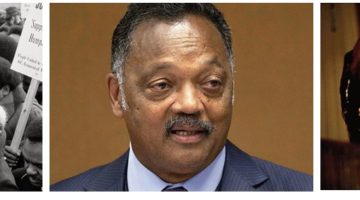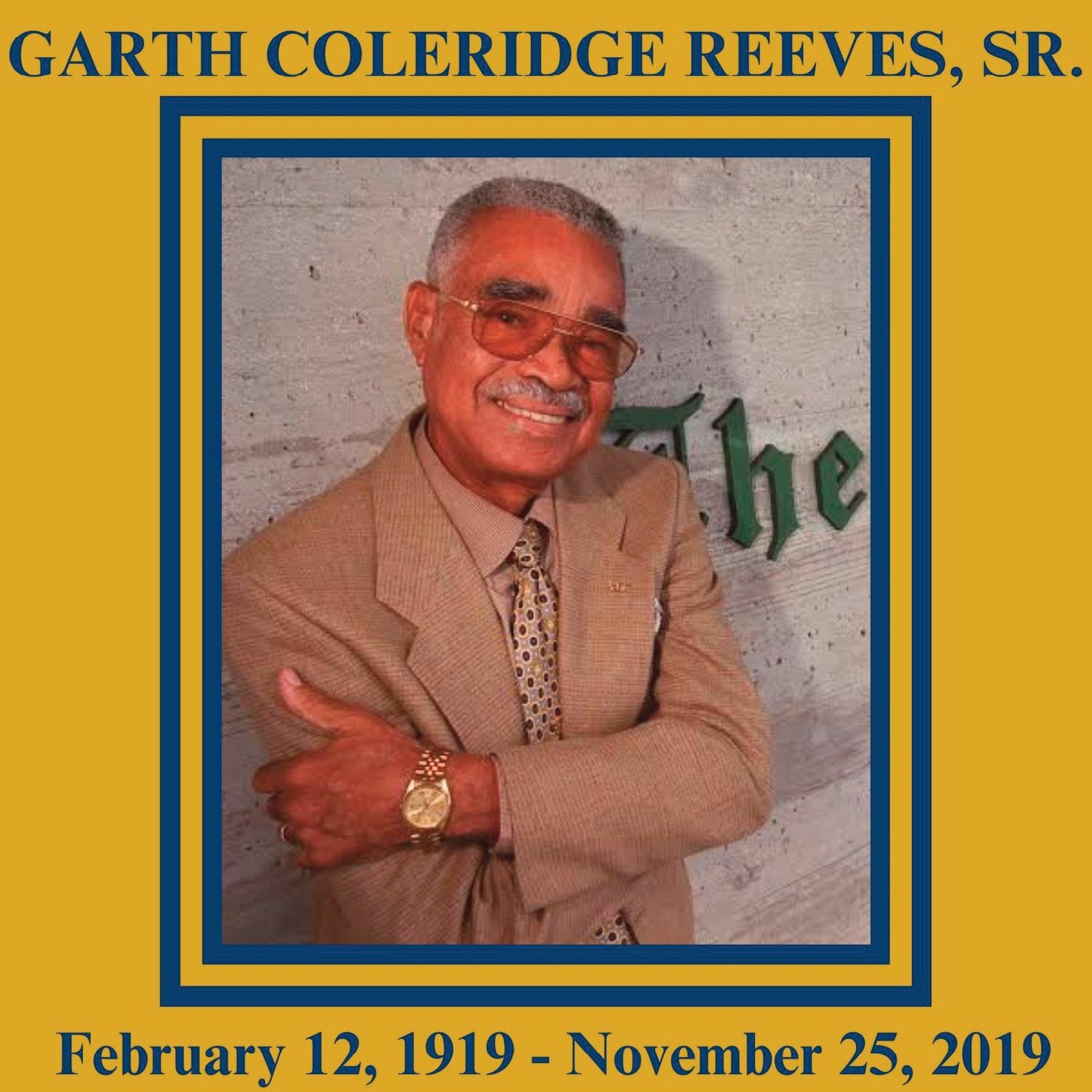Garth C. Reeves, Sr. was an icon in Miami-Dade County. He was a successful businessman, a generous philanthropist, a civic mover and shaker, a civil rights leader, a war veteran, and the owner and publisher of The Miami Times newspaper.
Mr. Reeves was a native Bahamian who was raised in Miami-Dade County from infancy. His father, Henry E. Sigismund Reeves, was the founder of The Miami Times – South Florida’s largest Black weekly newspaper which was founded 101 years ago.
After graduating from tradition rich Booker T. Washington High School, Mr. Reeves earned his Bachelor’s Degree from historically Black Florida A&M University. He then enlisted in the army, where he served honorably in World War II for five years. Upon returning from the war, he joined his father at The Miami Times, and focused with intentionality on writing persuasively and powerfully against segregation, racism, and hate.
Mr. Reeves was a passionate voice for the Black community. He had a soft yet powerful voice in the community, speaking up for equal rights and equal opportunities for Black people. He was also a major donor who quietly supported civil rights organizations, non-profit organizations, and his beloved Booker T. Washington High School.
When Crandon Park Beach was desegrated, Mr. Reeves was one of the leaders who put his life on the line to wade into the water in the face of police intimidation and racist death threats. When Miami Springs Golf Course was desegregated, he was also one of the leaders in that courageous campaign. Mr. Reeves used The Miami Times newspaper to consistently fight for civil and human rights throughout his community, the county, and the country.
Mr. Reeves was a proud member of the NAACP and served as Chairman of the Board of the Black Archives. He also served as a board member of the United Way of Dade County and Miami-Dade Community College. He had a dynamic tenure as President of the National Newspapers Association. Personally, he was a proud member of Omega Psi Phi Fraternity and the Boule, and a faithful member of the Episcopal Church of the Incarnation. Mr. Reeves was inducted into the National Association of Black Journalists Hall of Fame, and he received the Miami-Dade Chamber of Commerce’s H.T. Smith Lifetime Achievement Award.
Garth C. Reeves Sr. lived a life that made a positive difference for so many people. He was a Miami treasure, a favorite son of Florida, and a great American. Mr. Reeves was still mentally sharp and physically active when he passed away at the age of 100 – earning the respected moniker of “Elder Statesman”. His legacy lives on through The Miami Times and his philanthropy.
Jessie Collins Trice was a trailblazer in healthcare. Ms. Trice was also a pioneer. She was the first African American to receive a nursing degree from the University of Miami, the first African American to chair the Florida Board of Nursing, and the first to serve as Director of Nursing for the Dade County Department of Public Health.
Ms. Trice was born in Georgia and studied nursing at Grady Memorial Hospital in Atlanta. Her dedication and commitment to the nursing field led her to relocate to Miami where she graduated from the School of Nursing and Health Studies at the University of Miami with a Bachelor of Science Degree in Nursing and a Master’s Degree in Public Health. She was also a proud member of Alpha Kappa Alpha Sorority.
As a nurse, administrator, mother, humanitarian, and champion for healthcare, Ms. Trice dedicated her life to bringing healthcare to not only low-income communities within Miami-Dade County, but also to Miami’s most vulnerable residents. She founded Miami’s first federally qualified health center – Economic Opportunity Family Health Center – in a trailer, providing primary healthcare services.
Ms. Trice established a community daycare program and South Florida’s first residential treatment facility dedicated to helping pregnant women deliver drug-free babies. As a leader in healthcare, she served as Chairwoman of the Board of the National Association of Community Health Centers and the Florida Association of Community Health Centers. She was also the founder of the Miami-Dade County Black Nurses Association.
She founded the Jessie Trice Community Health Systems which provides the following healthcare services throughout Miami-Dade County: Pediatrics, Obstetrics and Gynecology, Mental Health Wellness, Nutrition, School Based Healthcare, HIV/AIDS, Family Practice, Dentistry, and Substance Abuse. This quality healthcare system is named in honor of Jessie Collins Trice. She was a true visionary, leader and respected voice in public health.
From the floor of the United States House of Representatives, the Honorable Carrie P. Meek said:
“Jessie Collins Trice’s life was akin to that of a burning candle. A candle’s lifelong service is to shed light to illuminate the darkness of pessimism and hopelessness – until it is consumed. She conscientiously consecrated her life by serving God through her fellow human beings – especially the women and children from the inner city.”
In honor of her visionary leadership and extraordinary accomplishments, the Economic Opportunity Health Center was later named the Jessie Trice Community Health Center. Her legacy lives on through the 16 medical facilities, 8 Comprehensive Primary Care Centers, and 40 school-based centers across Miami-Dade County.
John David Johnson was an extraordinary lawyer and an extraordinary judge who came from an extraordinary family. Judge Johnson was known nationally for being the second judge to sit on the Miami Municipal Court – also known as the “colored court”. This was the only court of it’s kind in the history of the United States.
As a lawyer, he worked to eradicate many racially unjust laws. As a judge, he presided over thousands of cases. His family was one of the most influential Black families in Miami.
He was the youngest of seven children – all of whom graduated from college. He had a brother who was an internist, another who was a radiologist, and a third who was an accountant. His three sisters were all teachers. In the south during the first half of the 1900’s, this was a spectacular achievement by a Black family.
Judge Johnson was born in Miami’s Overtown neighborhood, called “colored town”. He graduated from revered Booker T. Washington high school, Virginia State College, and Howard Law School – affectionately called the law firm of the Civil Rights Movement.
Judge Johnson led legal efforts to desegregate the Miami Springs Golf Course and the Orange Bowl Stadium. He received threats for his aggressive legal attacks on Jim Crow laws, but he courageously continued to provide strategic and successful legal representation to Miami’s civil rights leaders like Father Theodore Gibson and Rev. Edward T. Graham. He famously prevented the Florida Legislature from obtaining a copy of the membership list of the Florida Chapter of the NAACP.
Judge Johnson presided over the colored court for five years. This court was located in a building in Overtown with a police precinct downstairs and a courtroom upstairs. The judge was Black (but was not allowed to wear a robe), all the patrolmen were Black, all of the staff was Black, and all of the defendants were Black.
Law enforcement officers at the “colored court” could not be licensed policemen because racist laws prevented Blacks from sitting in a classroom with whites at the police academy. They were given the title of patrolmen but were given no training. They were handed a uniform (that they could not take home), a badge, a gun and a bicycle. It is now a museum that is named the Black Police Precinct and Courthouse Museum located in Overtown.
Judge Johnson was married for 55 years to his loving wife – Johnalie Elizabeth Dennis – whose brother, Dr. William Dennis, was president of Albany State College. He was the uncle of Dorothy Jenkins Fields, historian and founder of The Black Archives Historic Lyric Theater Cultural Arts Complex. He was also a proud member of Alpha Phi Alpha Fraternity, and a charter member of the Church of the Open Door.












No Comment